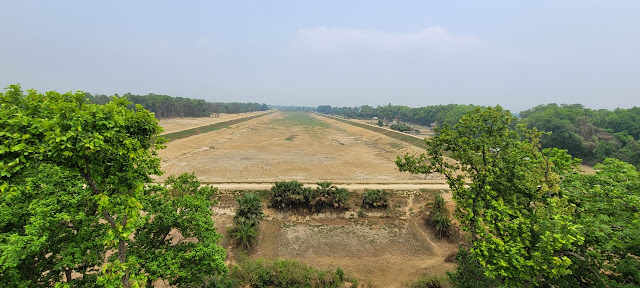Organic mango farmers overlooked for exports
The sweet scent of mango is in the air once again. But, instead of rejoicing, Rajshahi's orchardists are feeling uneasy. And the cause for their concern is the perplexing government attitude towards export of organic mangoes.
The organic mango growers in the region had invested earnestly to improve cultivation methods, prodded by an industry crisis several years ago brought about by excessive chemical use on mango crops.

They introduced the fruit-bagging method, which drastically cuts down the number of times mangoes are sprayed with pesticides before reaching the market.
Bagged mangoes are sprayed with pesticides about three times, in contrast to 62 times under the unethically-grown non-bagging method. Organic mango growers naturally hoped to benefit from increased exports. But the reality has been starkly different.
Bagged mangoes are sprayed with pesticides about three times, in contrast to 62 times under the unethically-grown non-bagging method. Organic mango growers naturally hoped to benefit from increased exports. But the reality has been starkly different.

“They have produced a safe, organic crop but the government is failing to notice it. The farmers are dispirited now,” said Md Anwarul Hoque, the convenor of the Rajshahi Agro Food Producers' Society, which represents about 300 organic mango producers from Rajshahi and Chapainawabganj.
There is a general concern that the loss-generating disregard for organic mangoes seen last year will prevail in export selection again, he said. Only about three tonnes of organic mangoes were selected for export out of the total export of 324 tonnes in 2017.

This gross disregard cost the organic producers about Tk 50 crore, who had substantially bumped up their production hoping to export 5,000 tonnes of mangoes after moderate success the previous year.
In 2016, 90 percent of the 665 tonnes of mangoes exported were sourced from the Rajshahi region.
On July 10 last year, on behalf of the aggrieved organic mango farmers, Hoque submitted a complaint to the Prime Minister's Office about the Department of Agriculture Extension's export management, especially to the lucrative European Union market.
He alleged that some officials in the department's plant quarantine wing were persuaded to unduly favour mangoes produced through non-bagging method for export.
Hoque's allegations were subsequently investigated by a committee led by the chairman of the Bangladesh Food Safety Authority, Mohammad Mahfuzul Haque.

In 2016, 90 percent of the 665 tonnes of mangoes exported were sourced from the Rajshahi region.
On July 10 last year, on behalf of the aggrieved organic mango farmers, Hoque submitted a complaint to the Prime Minister's Office about the Department of Agriculture Extension's export management, especially to the lucrative European Union market.
He alleged that some officials in the department's plant quarantine wing were persuaded to unduly favour mangoes produced through non-bagging method for export.
Hoque's allegations were subsequently investigated by a committee led by the chairman of the Bangladesh Food Safety Authority, Mohammad Mahfuzul Haque.

The Daily Star obtained a copy of the probe report, submitted on November 1 last year. The report stated that the DAE's officials did demonstrate 'neglect and apathy' towards organic mangoes. The committee found a lack of coordination between the safe mango producers, the department and its quarantine wing.
Subsequently, the report recommended the promotion of organic mangoes in the coming years in line with the national action plan for safe fruit production.
But the organic growers are yet to see any action by the DAE. “Nobody has made any contact with the organic mango farmers to discuss exports yet,” Hoque said.

For mango exports to the EU, exporters are required to enter into contract arrangements with growers through the DAE in advance, said Mohammad Mohsin, the department's director general.
“It is not the method of cultivation that we foremost consider but whether or not the mango crop can meet the prescribed qualities set by the importing countries.”
Mohsin said the probe committee's recommendations were implemented -- including the preference for mangoes produced using the fruit bagging method.
“We arranged contracts with 312 organic mango farmers in the Rajshahi region in November, with the aim of facilitating exports by 28 exporters,” he added.
Agriculture department officials in Rajshahi and Chapainawabganj, however, said they are unaware of any such contracts.



Comments
Post a Comment